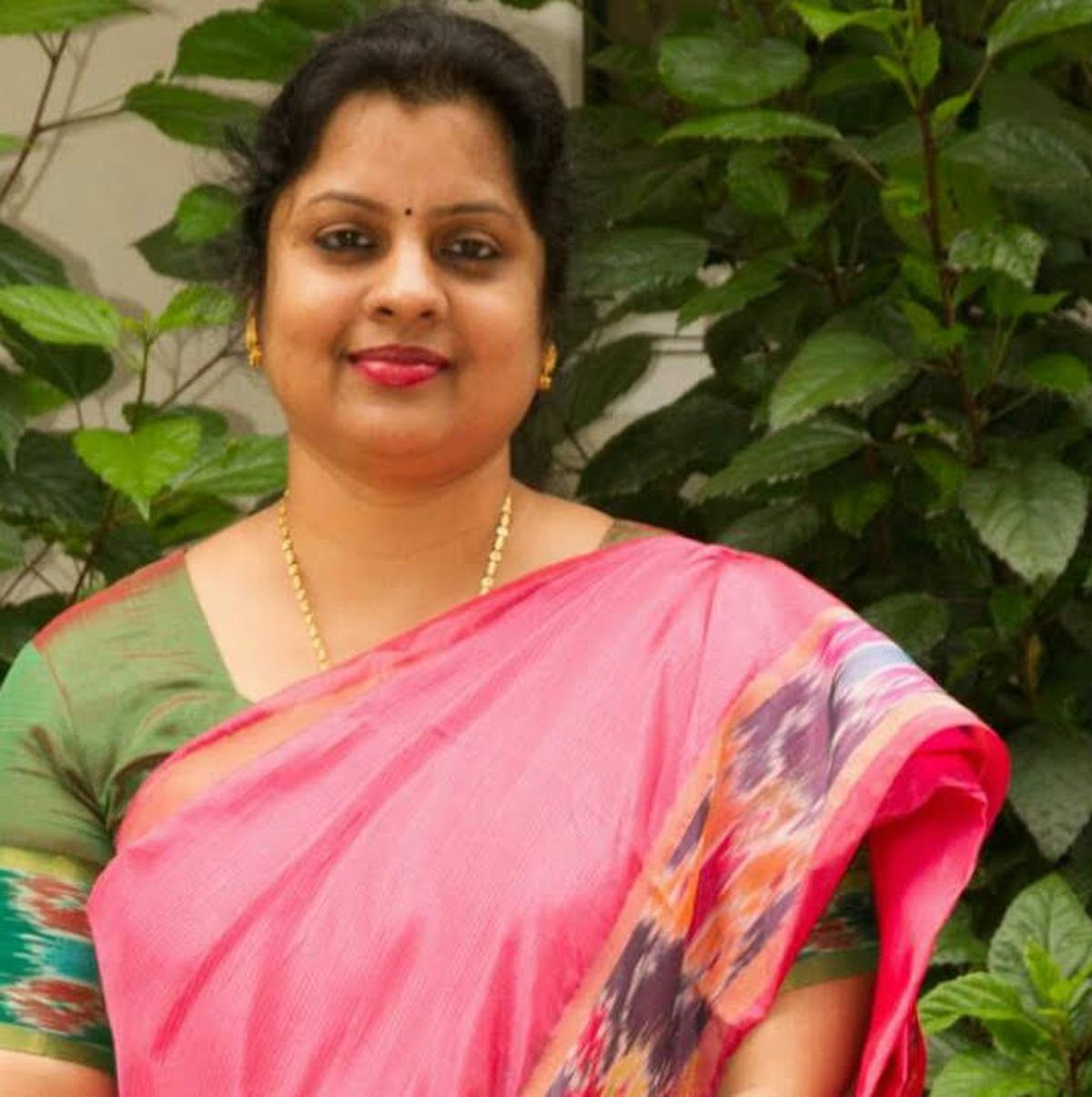Looking to incorporate a touch of patriotism pinned on your outfit this Independence Day? Head to Prabhavana Multi-State Women’s Cooperative Society Limited on Yellareddyguda Main Road, near Maduranagar Metro Station, Hyderabad. Here, skilled women meticulously craft vibrant tricolour flags, complete with the iconic blue chakra. This bustling centre is not just about creating symbols of national pride but also about empowering women through meaningful work.
Prabhavana coopertive society members
| Photo Credit:
Special arrangement
The place is also a treasure trove of jute products, including lunch bags, laptop bags, attractive multipurpose carry bags, and women’s sling bags — the handiwork of the cooperative’s women.

Deepa Dhurjati Sanka
| Photo Credit:
Special arrangement
Deepa Durjhati Sanka, an MBA graduate and founder and president of Prabhavana, has spearheaded a vision of social development and women’s empowerment through a cooperative model. Her initiative focusses on creating self-employment opportunities for women and members of the transgender community, leveraging natural fibre products to drive economic and social progress. After quitting her bank job, Deepa took a leap of faith and became a technopreneur.
Divine beginnings
A simple idea to create jute prasadam bags for Tirumala Tirupati Devasthanams (TTD) evolved into a significant project for Deepa. Driven by a strong emotional motivation, Deepa faced the challenge of creating cost-effective jute bags with specific TTD requirements. After successfully developing a sample and gaining approval from TTD’s Executive Officer, the project expanded, supplying one lakh bags daily. Recognising the potential impact on local women and the natural fibre industry, Deepa sought support from the National Jute Board, which led to the formation of India’s first women-run multi-state cooperative society focused on natural fibre products, operating in Telangana, Andhra Pradesh and Karnataka
Deepa worked with the Ministry of Textiles as a centre manager overseeing textile handicrafts and jute projects in Telangana and Karnataka from 2014 to 2016. Says Deepa, “I was particularly drawn to jute because it offers a viable self-employment opportunity for women, as it requires only basic tailoring skills. Unlike the saturated clothing market, jute products are long-lasting and biodegradable, making them an excellent choice for sustainable businesses.” Inspired by these social and environmental benefits, Deepa started her jute product business after her tenure with the Ministry.
Inclusive initiative
Transgender community members of Prabhavana with their products
| Photo Credit:
Special arrangement
The cooperative business model has been a game-changer for Deepa’s endeavours. Prabhavana has empowered women through skill development and employment opportunities, turning them into proud cooperative shareholders. The ripple effect of their efforts has also reached the transgender community, providing them with a platform to transition from traditional activities to entrepreneurship.
Prabhavana’s contributions to the transgender community were recognised and was honoured with the Telangana State Women Commission Award in 2022.
Stories of success
Deepa recounts Prabhavana’s success stories, highlighting how their lives were transformed through their efforts. Victoria, their trainer, earned recognition from the Women Development and Child Welfare Department for her training of transgender women. Roja, a beneficiary who lost her husband, received essential provisions and financial support to pay the college fee for her daughter. Samina, who received a collateral-free loan to sustain her papad business, now works full-time with Prabhavana.
Premleela, a transgender entrepreneur, won the Ministry of Micro, Small and Medium Enterprises (MSME) registration and National Small Industries Corporation (NSIC) certification, becoming the first transgender in India to do so, and was nominated for a national award. Sahasra, another transgender woman, successfully sold her jute products at Shilparamam for 15 days.
Deepa’s commitment to empowering women extended to supporting two tribal children from the Nallamala forest region. She secured free accommodation for the kids at a Welfare Home in Hyderabad, and Oxford Grammar School provided free education and transportation. Deepa aims to inspire more tribal children to enter mainstream schools and encourages corporate schools to offer similar support.
At Prabhavana, students can do internships; so far, three students have earned certification in social business models, says Deepa. “They come from diverse backgrounds: one from Christ College in Bengaluru, another from Dehradun Petroleum and Energy University, and a third from a local college.”
Challenges aplenty
Deepa’s journey in establishing Prabhavana was not easy; she faced numerous challenges in managing her cooperative society, including a difficult and prolonged registration process exacerbated by halted MSCS (Multi-State Cooperative Society) registrations and a lack of guidance. She says her struggle was more because of the low awareness and acceptance of the cooperative business model, which is often confused with NGOs. “Financial institutions were hesitant to provide loans to cooperatives, especially those focused on women. We have encountered gender bias, with some men making sarcastic remarks about women in business. Despite the challenges, over 20 current and former government officials and bank managers, all men, have steadfastly supported and motivated us,” Deepa emphasises, underscoring the importance of men and women working together to bring about societal change.
Deepa’s initiative has significantly broadened its jute product line, which now includes school uniforms, handmade items, and carpets. Prabhavana is also developing innovative, biodegradable food packing materials from natural fibre and eco-friendly sapling bags that support farmers and reduce recycling costs. The national tricolours are crafted from Birla Purocel viscose fibre, an eco-friendly, biodegradable, and compostable material. Prabhavana, in association with Aditya Birla scientists, has been working on developing viscose biodegradable low-cost packaging materials for the past two years.
Emphasising jute’s natural strength and golden hue, Deepa says they aim to offer affordable, sustainable alternatives to single-use plastics, with one jute bag replacing hundreds of plastic ones.
Regarding her expansion plans, Deepa wants to take their women’s cooperative model to every state in India. “Women, whether from rural or urban areas, represent a vast untapped resource. By igniting their skills, they can significantly contribute to the development of their families and the nation. Currently focused on natural fibres, our cooperative plans to enter sectors such as food processing, education, and healthcare,” states Deepa.